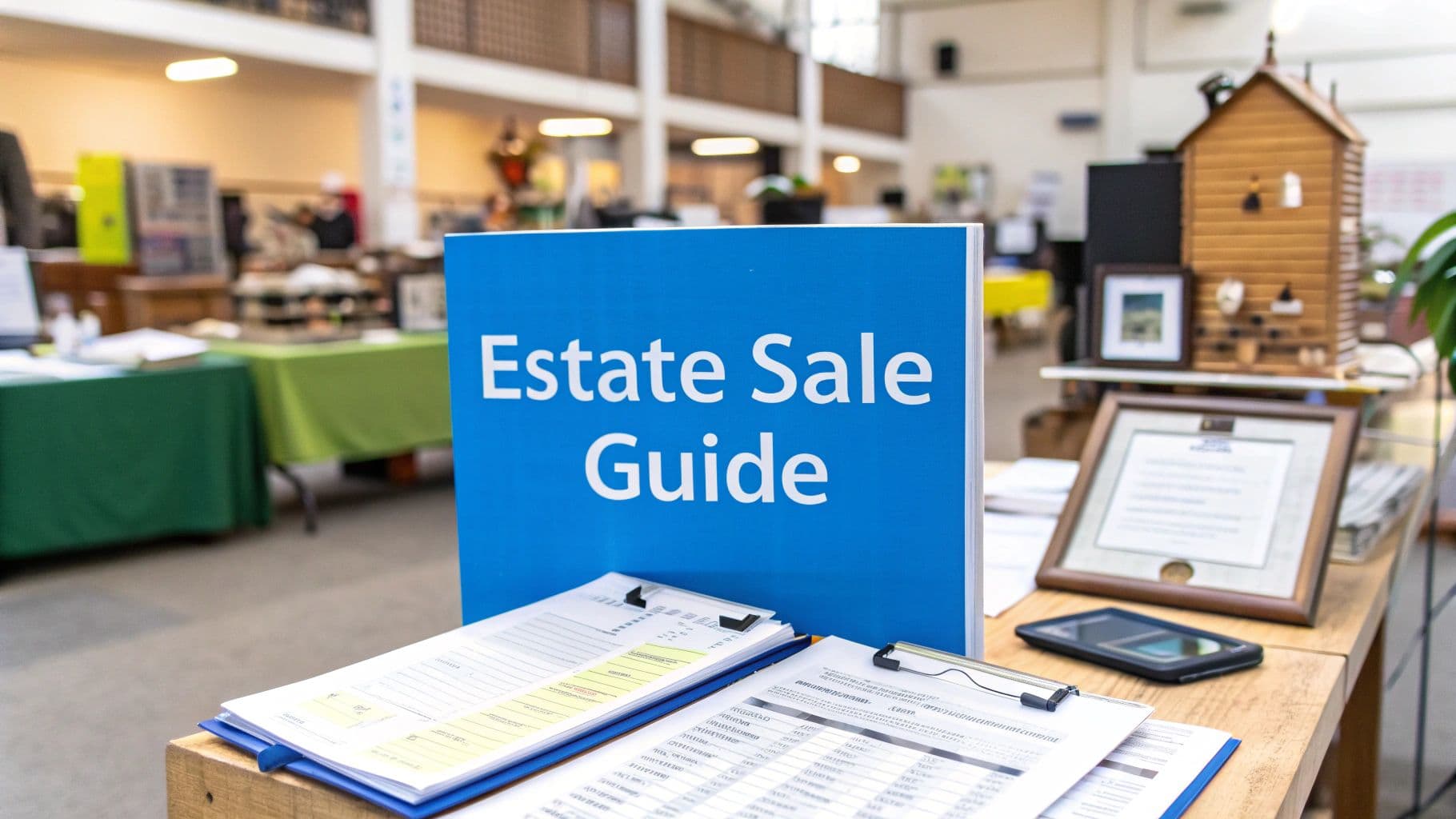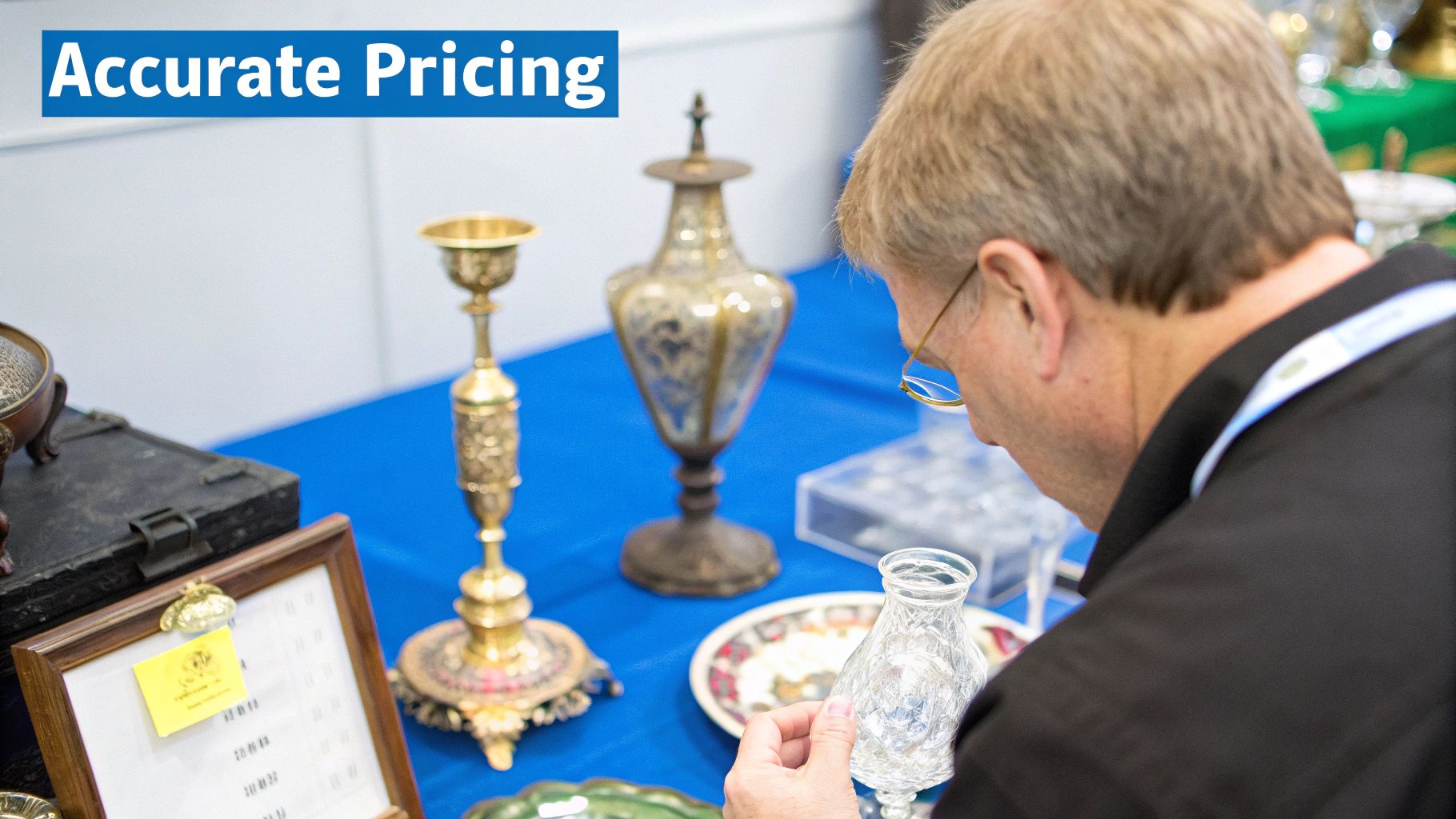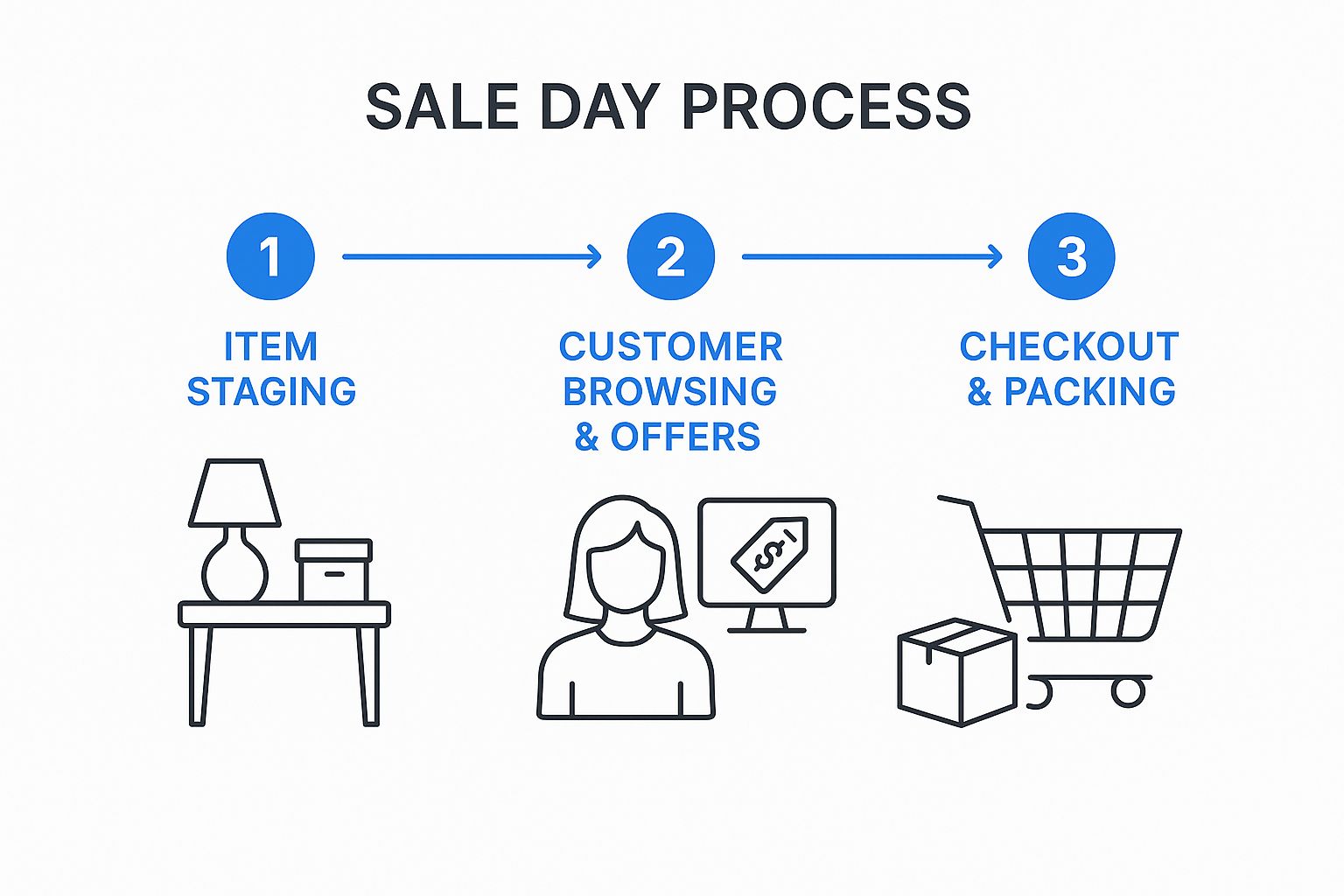A Guide to Professional Estate Sales

When people hear "estate sale," they often picture a dusty old house filled with antiques. But that’s only a tiny part of the story. A professionally managed estate sale is less like a yard sale and more like a pop-up retail store meticulously set up inside a home.
What Exactly Is a Professional Estate Sale?
The goal is simple: to sell nearly everything inside a house, from the couch and coffee maker to the fine china and power tools, in a short, organized period. It's a full-service liquidation designed to get the best possible financial return while completely clearing a property.

This kind of service becomes a lifeline during major life transitions, which are often stressful enough on their own. The most common situations we see are:
- Settling a Loved One's Estate: An executor has the immense responsibility of managing a person's final affairs. An estate sale is the most efficient way to turn personal belongings into liquid assets for heirs or to pay off any outstanding debts.
- Downsizing for Retirement or a Move: Moving into a smaller home, condo, or assisted living facility means a lifetime of accumulated possessions simply won't fit.
- Major Relocation: If you're moving across the country, it's often far too expensive and impractical to take everything with you. A sale helps fund the next chapter.
- Divorce or Bankruptcy: Sadly, these events often require the fair and transparent division of shared property. An estate sale provides a clear path forward.
The Team and the Process Behind the Scenes
This isn't a one-person show. When you hire a professional estate sale company, you're getting an entire team. They are the conductors of the whole orchestra, handling the sorting, organizing, deep-dive research, and pricing for every single item in the home.
For the really special stuff—think antique furniture, fine jewelry, or a unique art collection—they often bring in a specialized appraiser. This is a game-changer. It ensures items are priced based on real-time market value, not just a guess or sentimental attachment. That expertise is what separates a professional operation from a weekend hobby.
"A common misconception is that estate sales are only for the wealthy or for antiques. In reality, they are for anyone who needs to sell the majority of a home's contents efficiently and for fair market value."
The need for this service has been growing steadily. In the U.S., the estate liquidation industry pulled in an estimated $230.3 million in revenue in 2024. This isn't surprising when you consider the aging population navigating the exact life changes that make these sales necessary. If you're interested in the numbers, you can read more about the estate sale market trends and what's driving them.
Why Bringing in a Pro Makes All the Difference
Let's be honest: trying to manage an estate sale yourself is a monumental task. It's emotionally draining and physically exhausting. The sheer amount of work—sorting through decades of memories, cleaning, pricing thousands of items, marketing the event, and then managing crowds of people in your home for days—is more than most people can handle.
Deciding between a DIY approach and hiring a professional is a crucial first step. Here's a quick comparison to help you weigh the pros and cons.
Comparing Estate Sale Approaches: DIY vs. Professional
| Aspect | DIY Estate Sale | Professional Estate Sale |
|---|---|---|
| Effort & Time | Extremely time-consuming; you handle everything from sorting to security. | Minimal effort required from you; the company manages all logistics. |
| Pricing Expertise | Based on guesswork or basic online searches; high risk of underpricing. | Expert appraisal and market research ensure items are priced for maximum return. |
| Marketing Reach | Limited to personal networks, social media, and local signs. | Broad marketing to an established network of buyers, collectors, and dealers. |
| Sales & Negotiation | You must handle all haggling and transactions directly with shoppers. | Experienced staff manages sales and negotiations to protect value. |
| Security & Liability | You are responsible for crowd control, theft, and any accidents on-site. | Professionals are insured and manage security to protect the home and assets. |
| Emotional Toll | Can be incredibly difficult, especially when selling a loved one's belongings. | Provides an emotional buffer, allowing you to focus on family matters. |
Hiring a professional team lifts that massive weight off your shoulders. They bring an impartial eye to pricing, a marketing machine to draw in the right buyers, and the logistical expertise to run a safe, secure, and profitable event. They know how to navigate tricky family dynamics and handle the process with the dignity it deserves.
Ultimately, a professionally managed estate sale turns an overwhelming challenge into a successful, manageable project.
Finding and Vetting the Right Sale Company
Picking the right company for your estate sale is easily the most important decision you'll make. This isn't just about hiring someone to sell stuff; it's about trusting a stranger with a home packed with memories and valuable assets. A quick Google search is where you start, not where you finish.
You need to dig deeper to find a truly reputable company. Look for professionals who are established in your community and have a long, verifiable history. It's common to find seasoned pros who came from related fields, like real estate, where deep networks are everything. In fact, according to the National Association of Realtors, the average Realtor is 57 years old, and those with over 16 years of experience earn far more—a testament to how much experience is valued in property-related industries. You can see more data on this in the 2025 NAR Member Profile.
Understanding Their Fee Structure
One of the first conversations you'll have is about how they get paid. Most companies use one of two models, and knowing the difference is crucial for protecting your bottom line.
- Commission-Based Fee: This is what you'll see most often. The company takes a percentage of the gross sales, usually somewhere between 35% and 50%. This structure gives them a direct incentive to price items well and sell as much as possible.
- Flat Fee: This is less common. You agree on a single, fixed payment for their services, no matter how much the sale brings in. It can be a good option if you have an estate filled with exceptionally high-value items and you want to put a cap on the company’s cut.
Always, always ask for a detailed breakdown of what the fee covers. Does it include advertising costs, staffing for the sale days, credit card fees, or the post-sale clean-out? Those "little" costs can add up fast and take a huge bite out of your final check. For a deeper dive, our guide on choosing between different estate sale and auction companies can help.
Verifying Credentials and Protections
Never just take a company’s word for it. A true professional will be completely transparent and ready to show you their credentials. This isn't just about building trust—it's about protecting yourself from major liability.
You need to ask for proof of general liability insurance and bonding. Insurance protects your property from any damage that could happen during the sale. Bonding protects you from potential theft by the company or its employees. If they hesitate or make excuses when you ask for these documents, that’s a massive red flag.
A solid, professional company operates like any other legitimate business. They should have clear insurance, a transparent contract, and a verifiable history of successful sales. If it feels too casual, it probably is.
Questions to Ask Every Potential Company
Once you have a shortlist of two or three candidates, it’s time to interview them. Treat it exactly like you’re hiring someone for a critical job, because you are. Come prepared with a list of questions so you can compare their answers side-by-side.
Here are a few essential questions to get the ball rolling:
- Experience with Similar Estates: "Can you show me examples of sales you've run for estates similar to this one in size and value?" A company that mostly handles small downsizing jobs may not be the right fit for an estate with fine art or rare collections.
- Marketing Strategy: "How do you advertise your sales? Can you tell me about your email list and social media following?" You want to see a modern, multi-channel approach that goes beyond a simple newspaper ad.
- Appraisal Process: "How do you value items that require special knowledge, like coins, jewelry, or military memorabilia?" A great company won't guess; they'll have a network of specialist appraisers they bring in.
- Security and Staffing: "What's your plan for security during the sale, and how many people will you have working?" They need a clear strategy for managing crowds, watching over valuables, and preventing theft.
- Contractual Terms: "Could I see a sample of your contract?" Read the fine print. Pay close attention to the payment schedule, cancellation policy, and what their process is for handling unsold items.
Choosing the right partner sets the entire tone for the sale. Taking the time to properly vet your options will pay off in the end, ensuring you get the best financial return while honoring the contents of the home.
The Art of Inventory and Strategic Pricing
This is where an experienced estate sale company really earns its keep. The meticulous planning shifts into high gear, transforming a home filled with personal history into a properly organized retail space. It all comes down to two things: a painstaking inventory process and a savvy understanding of what items are actually worth.

The first real task is a top-to-bottom sort-through of every room, closet, and cabinet. It’s a bit of a treasure hunt, separating everyday household goods from those surprise finds. Professionals will work right alongside the family to carefully set aside sentimental items that aren't for sale, making sure personal keepsakes are safe and sound.
From Cataloging to Valuation
With the family's items secured, the real cataloging work begins. This isn't just about making a quick list; it's a detailed documentation of everything in the home. Items are logically grouped, which makes pricing and staging so much easier down the road. It's this systematic approach that keeps the entire sale running smoothly.
Most modern companies now use specialized software to build out the inventory. This lets them track every single item and sale digitally—a huge leap forward from the old days of pen-and-paper lists. It also means you get a crystal-clear record for the final accounting. If you're curious about the nuts and bolts, our guide on best practices for inventory management dives deeper into the process.
Next up is valuation, and this is where a pro’s experience is worth its weight in gold. They can walk through a home and quickly put a fair market value on thousands of different items. They just know what furniture brands are hot, which kitchen gadgets will sell, and how to price tools and books to move.
Pricing is part art, part science. It's about balancing an item's real value with today's market demand, its condition, and the mindset of an estate sale shopper who is always hunting for a great deal.
For the truly unique or high-value pieces, you can't just guess. A reputable company will immediately flag items that need a specialist's eye.
- Fine Jewelry and Watches: A certified gemologist might be brought in for an appraisal.
- Artwork and Sculptures: An art appraiser can confirm authenticity and value.
- Rare Coins or Stamps: A numismatist or philatelist provides an expert valuation.
- Antique Furniture: An antiques expert can spot valuable period pieces and assess their provenance.
This is what prevents you from accidentally selling a $5,000 painting for $50—a mistake that’s all too common in a DIY sale.
Crafting a Smart Pricing Strategy
With a full inventory and solid valuations in hand, the company develops a pricing strategy aimed at getting the best possible return over the few days of the sale. It’s more than just slapping price tags on things; it's a living plan that adapts to how shoppers behave.
Interestingly, the broader economy is giving the estate sale market a boost right now. With tariffs making new goods more expensive, more people are turning to the second-hand market. At estate sales, they can often find quality items for 30% to 70% below what they'd pay in a store. This trend brings in more shoppers and drives up sales volume.
A smart, multi-day pricing model often looks something like this:
| Sale Day | Pricing Strategy | Shopper Psychology |
|---|---|---|
| Day 1 | Items priced at full fair market value. | Attracts serious collectors and resellers looking for the best stuff. |
| Day 2 | A planned discount is rolled out, often 25% off. | Pulls in the bargain hunters who were waiting for a price drop. |
| Day 3 | Deeper discounts are common, like 50% off. | The focus shifts to liquidating what's left and clearing the house. |
This tiered approach creates a sense of urgency and appeals to different kinds of buyers. The pros know exactly how to set the initial prices so that even with a final-day discount, the overall return for the estate is strong. They’re constantly balancing the goal of making the most money with the equally critical goal of leaving the house empty—fulfilling their contract and giving the family a truly clean slate.
Marketing Your Sale to Attract Eager Buyers
You've done the hard work of sorting, staging, and pricing. Now comes the part that actually makes the sale a financial success: getting people to show up. A professionally run sale has a line of eager buyers waiting before the doors even open, and that doesn't happen by accident.
It all starts with top-notch photography. Blurry, dark photos just won't do. A pro takes hundreds of well-lit, beautifully staged pictures that make the items pop. They capture everything from the curve of an antique chair to the details on designer handbag.
Each photo gets a compelling, specific description. "Brown chair" becomes "Mid-Century Modern Adrian Pearsall Walnut Lounge Chair, original upholstery." This level of detail is what catches the eye of serious collectors and resellers who are hunting for specific treasures.
Building an Online Presence
Let's be real: almost every serious estate sale shopper starts their search online. This is where the pros focus their energy.
Listing the sale on a major hub like EstateSales.net is an absolute must. These sites are the central meeting point for a dedicated community of buyers. A single, well-crafted listing can put your sale in front of hundreds of motivated shoppers in your area.
Beyond that, social media is huge. Smart companies use platforms like Facebook and Instagram to:
- Create Event Pages: This is perfect for sharing updates, answering questions, and seeing who's interested in coming.
- Post "Sneak Peek" Photo Galleries: They'll drop teaser albums a few days before the sale to build excitement and show off the star items.
- Run Hyper-Local Ads: They can target ads to people in specific zip codes who have shown interest in antiques, tools, or vintage clothing.
"Effective marketing is about telling a story. Each photo and description should give a glimpse into the history and quality of the items, transforming a simple listing into an invitation to a treasure hunt."
The Power of a Dedicated Following
The best professional estate sales companies aren't just marketing one-off events. They've spent years building a loyal following. They maintain massive email lists—often with thousands of subscribers—full of past customers, dealers, and collectors who want to know about their next sale.
That email list is pure gold. An email blast sent a couple of days before the sale instantly alerts a huge, pre-qualified audience. For a deeper look into a comprehensive promotional strategy, you can find more great insights in our complete guide to effective estate sale marketing. These are the people who show up first and are ready to buy.
Don’t Forget Physical Signage
As important as digital marketing is, you can't skip the old-school approach. Professional, easy-to-read signs are critical for guiding people to the house on sale days.
And I'm not talking about a single sign on the front lawn. A good company blankets the area. They place bright, uniform signs at major intersections, key cross-streets, and every turn leading into the neighborhood. The goal is to make it impossible for anyone driving by to miss, pulling in both the dedicated shoppers and the curious neighbors who just happen to be out.
Running a Smooth and Secure Sale Weekend
After all the weeks of prep work, sale weekend is finally here. This is where a professional estate sale company’s real-world experience truly makes a difference. They don't just open the doors; they transform a private home into a pop-up retail shop that's secure, easy to navigate, and profitable for a few short days.
It all starts with smart staging. A pro doesn't just randomly place items on tables. They'll design a specific traffic flow to guide shoppers through the house, preventing those awkward bottlenecks in tight hallways and making sure everything gets seen. High-value stuff like jewelry or small collectibles? That gets moved to a single, constantly staffed spot, usually right by the checkout for an extra layer of security.
Managing the Flow of People and Payments
The first hour of any good sale is intense. You'll often see a line of eager buyers forming well before the doors even open, and that initial rush needs to be handled just right. A professional crew will control the entry, letting in a set number of people at a time to keep the house from turning into a chaotic free-for-all.
Once shoppers are inside, the process is designed to be as smooth as possible. This infographic gives a great visual of how a typical sale day works.

As you can see, a structured approach is everything. From how items are displayed to how the final checkout is handled, every step is managed by staff who know exactly what they're doing.
A well-run sale feels busy but never chaotic. Every team member has a specific job, whether it's answering questions on the floor, managing the hold area, or running the checkout. This clear division of labor is the secret to a stress-free event.
Getting payments right is also a huge piece of the puzzle. Cash is still around, but almost every professional sale now takes credit cards and mobile payments. Honestly, this is a game-changer—it can boost total sales by as much as 30% simply by making it easier for people to buy. The company brings all the gear and makes sure every transaction is secure.
To keep everything on track during the busiest moments, here’s a quick rundown of what a professional team is managing.
Estate Sale Day Checklist
This checklist breaks down the critical tasks that ensure the sale days run without a hitch.
| Task Category | Key Actions | Pro Tip |
|---|---|---|
| Crowd Control | Manage the opening rush by staggering entry. Maintain a comfortable capacity inside the home. | Use a simple number system for entry to keep it fair and organized for those who arrived early. |
| Transaction Mgmt | Have a dedicated checkout station with multiple payment options (cash, card, mobile). | Keep small bills and change on hand for cash buyers, especially during the first few hours. |
| Staffing & Security | Position staff in every key area. Keep high-value items near the checkout. Monitor a single entry/exit point. | Have staff wear matching shirts or vests so they are easily identifiable to shoppers who need help. |
| Large Item Logistics | Create a designated "hold" or "sold" area. Schedule pickups for after-hours to avoid disruptions. | Use a two-part "sold" tag. One part stays with the item, and the other goes with the buyer as their receipt. |
| Customer Service | Greet shoppers, answer questions about items, and clearly explain the sale's rules (e.g., pricing discounts by day). | A friendly, helpful team encourages longer browsing and more sales. It makes all the difference. |
Following a clear plan like this is what separates a professional operation from a simple garage sale.
Security and Staffing for a Safe Event
Preventing theft is, frankly, a top priority. The single best deterrent is having plenty of staff on the floor. Team members are spread throughout the house, not just to help people but to be a visible presence. They're trained to spot suspicious behavior and discreetly keep an eye on things.
Beyond just having boots on the ground, pros use a few key tactics to protect the home and its contents:
- Controlled Entry and Exit: Everyone comes in and goes out through the same door. Staff might politely check large bags or boxes on the way out.
- Off-Limits Areas: Any part of the house that isn't part of the sale is clearly marked and locked or roped off. No exceptions.
- Staff Communication: The team is always connected, using radios or a group chat to instantly pass along messages if something needs attention in another room.
Then there's the art of the deal. Staff are trained to handle price negotiations professionally. They know the pricing strategy for each day of the sale—when to stand firm (especially on Day 1) and when to accept a reasonable offer to make sure items sell. This takes the emotional stress off the family and keeps it purely a business transaction.
Finally, there’s a system for all the big stuff. A "hold" area is set up where people can put large furniture they plan to buy. Once they've paid, a staff member will coordinate a pickup time, usually after hours or on a specific day. This prevents a couch from being hauled through a crowded sale and protects the walls and floors from damage. It’s this kind of organized thinking that makes the whole event run like clockwork.
Wrapping It Up: The Post-Sale Process and Final Accounting
The doors have closed and the last customer has gone home, but a professional estate sale company's job isn't quite done. This final stage is all about the clean-out and the numbers—clearing the property completely and giving you a crystal-clear financial breakdown of the whole event.

No matter how fantastic the sale, there will always be something left over. A truly professional company will have already discussed and agreed upon a plan for these remaining items. You should never be surprised by what happens next.
Your contract is key here—it should lay out all the post-sale options, keeping you in the driver's seat. The end game is always to leave the house totally empty and in what we call a "broom-swept" condition.
So, What Happens to the Unsold Items?
There's no single answer for what to do with leftovers; it really depends on what's still there and what you prefer. Most companies rely on a mix of a few solid strategies.
- Charitable Donations: This is the most common route. The company arranges for a local charity to pick up any usable furniture, clothing, and household goods. They’ll make sure you get a detailed donation receipt for your tax records.
- Consignment for High-Value Pieces: Did that antique sideboard or pricey piece of art not find the right buyer? Don't sweat it. Your estate sale team might suggest placing it on consignment with a specialty dealer or an auction house to reach a more focused market.
- The Final Clean-Out: For everything else—the items that can't be donated or consigned—the company will bring in a junk removal or clean-out service. This is the last step that gets the property completely empty and ready for whatever comes next.
The true measure of a great estate sale company is how they hand the property back to you. You shouldn't have to deal with a single leftover item. The home should be returned to you empty, clean, and ready for the real estate market or the next family.
The Final Numbers: Your Settlement Statement
Within the timeframe laid out in your contract, usually 7 to 14 business days post-sale, you’ll receive your check and a final settlement statement. This document is the bedrock of financial transparency.
This isn't just a generic invoice. A proper statement breaks everything down so you can see exactly how the numbers add up. It’s the final piece of the puzzle, proving the company did what they promised.
At a minimum, your settlement statement should include:
- Gross Sales: The grand total of all money brought in during the sale.
- Company Commission: The agreed-upon percentage the company earns from the gross sales.
- Itemized Expenses: A transparent list of any other pre-approved costs, like fees for a specialized appraiser, credit card processing, or the final clean-out service.
- Net Proceeds: The bottom line—the final amount you receive after the commission and expenses are deducted.
This detailed accounting ensures there are no last-minute surprises. It gives you a clean financial record, closing out the entire process professionally and giving you the peace of mind to move forward.